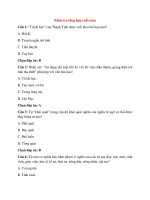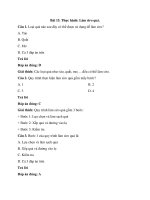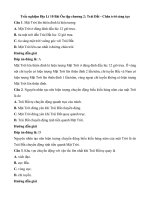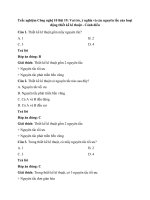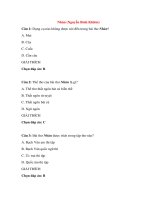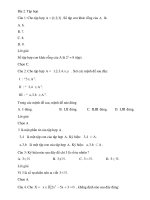Organizational behavior: Lecture 37 - Dr. Mukhtar Ahmed
Bạn đang xem bản rút gọn của tài liệu. Xem và tải ngay bản đầy đủ của tài liệu tại đây (1.04 MB, 43 trang )
Organizational
Behavior
(MGT-502)
Lecture-37
Summary
of
Lecture-36
Organizational
Culture
Organizational Culture?
• A common perception held by the
organization’s members; a
system of shared meaning
–Shared things
–Shared sayings
–Shared doings
–Shared feelings
How Organization
Cultures Form
Stories
Rituals
How Employees
Learn Culture
Language
Material
Symbols
Four Functions of Organizational
Culture
Organizational
identity
Sense-making
device
Organizational
culture
Social system
stability
Collective
commitment
Today’s Topics
How to Change a Culture
• If the culture no longer supports the
goals and strategy of an organization,
it should be changed.
• Mergers and acquisitions generally
result in a change in culture.
Requirements for Successfully Changing
Organizational Culture
• Understand the old culture first.
• Support employees and teams who have ideas
for a better culture and are willing to act on
those ideas.
• Find the most effective subculture in the
organization and use it as a model.
• Help employees and teams do their jobs more
effectively.
• Use the vision of a new culture as a guide for
change.
• Recognize that significant cultural change takes
time.
Changing the Culture of
an Organization
Define the
Elements of the
New Culture
Communicate the
New Culture to
Employees
Realign the
Organizational
Policies and
Practices to
Support the
New Culture
Evaluate the Culture
of the Firm in
Relation to the
Firm’s Mission
Replace Managers
and Employees
Who Do Not
Embrace the
New Culture
Use Formal
Mechanisms to
Reinforce and
Transmit the
New Culture
Guidelines for Managing
Cultural Diversity
• Organization members must:
– Recognize and value a variety of opinion and insight.
– Recognize the learning opportunities and challenges presented by
the expression of different perspectives.
• The organizational culture must:
– Foster high performance expectations for everyone.
– Stimulate personal development.
– Encourage openness.
– Make workers feel valued.
• The organization must have:
– A well-articulated and widely understood mission.
Actions Organizations Can Take
to Develop an Ethical Culture
• Be realistic in setting values and goals regarding
employee relationships.
• Encourage input from organization members
regarding appropriate values and practices for
implementing the culture.
• Do not automatically opt for a “strong” culture.
• Provide training on adopting and implementing
the organization’s values.
Effects of Organizational Culture on
Employee Behavior and Performance
• Allows employees to understand the firm’s
history and current approach.
• Fosters commitment to corporate
philosophy and values.
• Serves as a control mechanism for
employee behaviors.
• Certain cultural types may produce greater
effectiveness and productivity.
Culture’s Effects on Behavior
• Communication
• Cooperation
• Commitment
• Decision Making
• Implementation
Why is Org Culture Important?
• Behavioral guidelines
• Establishes commitment/identity
• Control mechanism
• Greater effectiveness and
productivity
Cultural Modifications in the
Current Business Environment
Support for a global
view of business
Reinforcement of
ethical behavior
Empowerment of
employees to excel
in product and
service quality
So What????
• Organizational culture matters!!
–Some firms are ethical
–Some firms value people
–Some firms like to work
–Some places value rules, status
–Employees behave differently
Organizational
Change
What Is Change??
When we speak of change, we mean
an alteration in organization design,
strategy or processes, or some other
attempt to influence an organization’s
members to behave differently
Jay W. Lorsch
Species Must Change or
They Will Die
Some have
failed to
change and
have died
Some have
changed
and have
thrived
Organizations, Too, Must
Change or Die
Change or
Disappear
External
What Are the
Forces for
Change?
Internal
